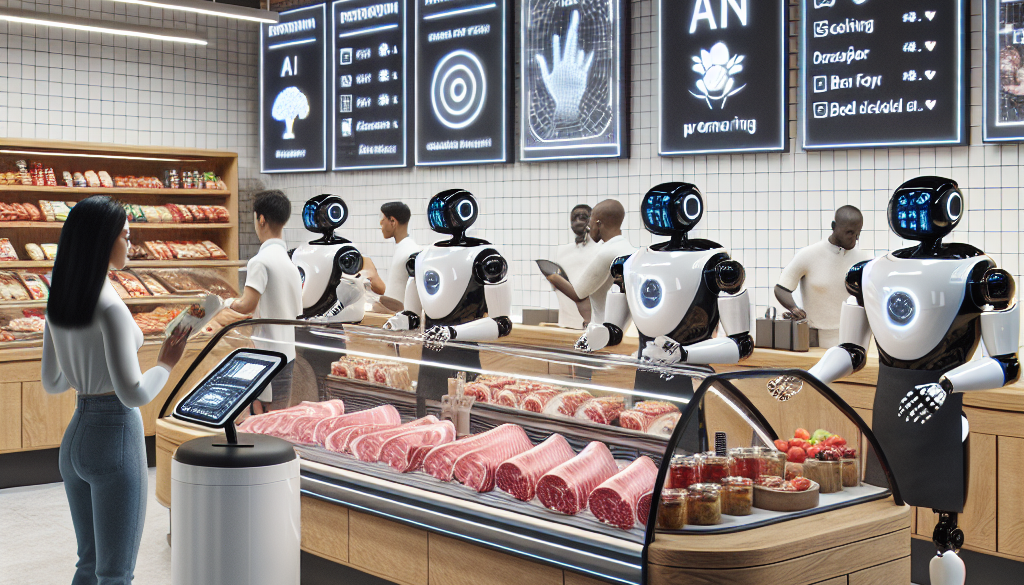Deli Future: Rethinking Prepared Foods Amidst Market Changes
-
Table of Contents
- Rethinking Prepared Foods: Adapting to Market Changes in the Deli Sector
- The Current State of the Deli Industry
- Challenges Facing the Deli Sector
- Innovative Strategies for Deli Success
- Emphasizing Healthier Options
- Leveraging Technology
- Committing to Sustainability
- Expanding Culinary Horizons
- Case Studies and Statistics
- Conclusion: The Future of Deli is Bright with Adaptation
- ETprotein: Elevating Deli Offerings with High-Quality Proteins
Rethinking Prepared Foods: Adapting to Market Changes in the Deli Sector

The deli department, once a haven for quick, convenient, and often indulgent food options, is facing a transformative period. Market changes, driven by evolving consumer preferences, technological advancements, and a shifting competitive landscape, are compelling deli operators to rethink their prepared food offerings. This article delves into the current state of the deli industry, the challenges it faces, and the innovative strategies being employed to ensure its future success.
The Current State of the Deli Industry
The deli sector has traditionally been a significant contributor to supermarket revenue, with prepared foods accounting for a substantial portion of sales. However, the industry is not immune to the broader trends affecting the food market. Health consciousness, convenience, sustainability, and personalization are among the key factors influencing consumer choices today.
Challenges Facing the Deli Sector
Several challenges are reshaping the deli landscape:
- Health and Wellness: Consumers are increasingly seeking out healthier options, including plant-based and organic foods, which has led to a decline in demand for traditional deli items that are perceived as less healthy.
- Convenience: The rise of meal delivery services and online grocery shopping has changed the way people access prepared foods, with many opting for these services over in-store deli purchases.
- Sustainability: There is a growing awareness of the environmental impact of food production and packaging, leading customers to favor businesses that demonstrate a commitment to sustainability.
- Competition: Delis are not only competing with each other but also with a variety of other food service options, including fast-casual restaurants and specialty food stores.
Innovative Strategies for Deli Success
To stay relevant and profitable, delis must adapt by embracing new strategies:
Emphasizing Healthier Options
Delis are expanding their offerings to include a wider range of healthy, nutritious options. This includes incorporating more fresh produce, lean proteins, and whole grains into their prepared foods. Some delis are also offering customizable salad bars, made-to-order sandwiches with healthier ingredients, and grab-and-go options that cater to dietary restrictions.
Leveraging Technology
Technology is playing a crucial role in the transformation of the deli sector. Online ordering systems, self-service kiosks, and mobile apps are being used to enhance customer convenience and streamline operations. Additionally, delis are utilizing data analytics to better understand consumer preferences and tailor their offerings accordingly.
Committing to Sustainability
Sustainability initiatives are becoming a priority for delis looking to attract eco-conscious consumers. This includes reducing food waste through better inventory management, using eco-friendly packaging, and sourcing ingredients locally to minimize carbon footprint.
Expanding Culinary Horizons
Delis are experimenting with global flavors and fusion cuisine to differentiate themselves and appeal to adventurous eaters. Offering seasonal and limited-time menu items can also create excitement and draw in customers looking for new experiences.
Case Studies and Statistics
Several delis have successfully navigated market changes through innovative approaches:
- A regional supermarket chain introduced a line of plant-based deli items, resulting in a 20% increase in prepared food sales within six months.
- A national grocery store implemented a zero-waste policy in its deli department, leading to a 15% reduction in food waste and a positive response from environmentally conscious shoppers.
According to a report by the National Association of Convenience Stores (NACS), prepared foods and beverages accounted for 22.5% of in-store sales in convenience stores in 2020, highlighting the importance of this category.
Conclusion: The Future of Deli is Bright with Adaptation
The deli sector is at a crossroads, with significant opportunities for those willing to adapt to the changing market. By focusing on health, convenience, sustainability, and culinary innovation, delis can remain competitive and continue to thrive. The key to success lies in understanding and responding to consumer demands while leveraging technology to enhance the customer experience.
ETprotein: Elevating Deli Offerings with High-Quality Proteins
As delis evolve, incorporating high-quality protein options becomes essential. ETprotein offers a range of organic bulk vegan proteins that can help delis cater to health-conscious consumers. Their non-GMO, allergen-free products, including rice, pea, and various seed proteins, are ideal for creating nutritious and delicious prepared foods that meet the demands of today’s market.
About ETprotein:
ETprotein, a reputable protein and L-(+)-Ergothioneine (EGT) Chinese factory manufacturer and supplier, is renowned for producing, stocking, exporting, and delivering the highest quality organic bulk vegan proteins and L-(+)-Ergothioneine. They include Organic rice protein, clear rice protein, pea protein, clear pea protein, watermelon seed protein, pumpkin seed protein, sunflower seed protein, mung bean protein, peanut protein, and L-(+)-Ergothioneine EGT Pharmaceutical grade, L-(+)-Ergothioneine EGT food grade, L-(+)-Ergothioneine EGT cosmetic grade, L-(+)-Ergothioneine EGT reference grade and L-(+)-Ergothioneine EGT standard. Their offerings, characterized by a neutral taste, non-GMO, allergen-free attributes, with L-(+)-Ergothioneine purity over 98%, 99%, cater to a diverse range of industries. They serve nutraceutical, pharmaceutical, cosmeceutical, veterinary, as well as food and beverage finished product distributors, traders, and manufacturers across Europe, USA, Canada, Australia, Thailand, Japan, Korea, Brazil, and Chile, among others.
ETprotein specialization includes exporting and delivering tailor-made protein powder and finished nutritional supplements. Their extensive product range covers sectors like Food and Beverage, Sports Nutrition, Weight Management, Dietary Supplements, Health and Wellness Products, and Infant Formula, ensuring comprehensive solutions to meet all your protein needs.
As a trusted company by leading global food and beverage brands and Fortune 500 companies, ETprotein reinforces China’s reputation in the global arena. For more information or to sample their products, please contact them and email sales(at)ETprotein.com today.












